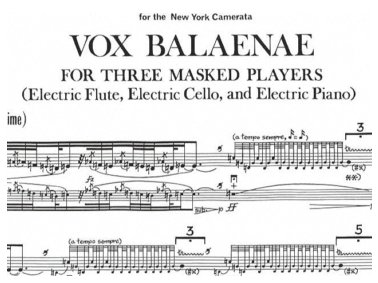
Music lovers are always searching for an evening that will take them out of themselves, but out-of-body experiences are rare, let alone out-of-species ones.
On March 30, “Vox Ballaenae,” or “Voice of the Whale,” by American composer George Crumb, will fill Lansing’s UrbanBeat Event Center with blue light and glassy, elusive tones inspired by the songs of whales.
It’s a deep dive into interspecies communion and an adventurous entry in the highly successful Absolute Music chamber series, which usually sticks to the safer waters of Brahms and Mozart.
Richard Sherman, fiery principal flutist of the Lansing Symphony, senses that the cultural vibe is right for “Vox Balaenae.”
“There’s a whole aural landscape that most people going to traditional chamber concerts have never heard before,” Sherman said. “It reminds people that they are not the center of the universe. This represents, not just whales specifically, but we’re a part of something bigger and need to take care of that bigger world.”
After hearing the first recordings of whales in the 1960s, Crumb amplified three instruments of a classical chamber trio — flute, cello and piano — and stretched their tonal palettes to deep-sea reaches of strange beauty. The work, performed for the first time in New York in 1971, is rarely heard.
Touches of theater, including oceanic blue lighting and black masks — both prescribed in the music’s score — shift the focus from the performers and their egos to even greater mysteries.
Sherman and cellist Carl Donakowsi will have to coax harmonic overtones from their instruments and whistle. In addition to playing conventional notes, the pianist caresses the strings with a glass rod, strums them and sends out clicks emitted from paper clips inserted between the strings.
Crumb’s demands on the flutist go beyond virtuosity to include multi-tasking. Simultaneously singing and playing flute is a feat more closely associated with jazzman Rahsaan Roland Kirk than Debussy or Schubert.
“I have to make enough of a flute sound to counterbalance what’s going on in my throat, and that’s more effective some times than others,” he said.
At the end of the piece, Sherman will play a set of crotales — small, tuned metal cymbals — perched on Donakowski’s cello stand.
“It’s kind of a smorgasbord of 20th-century extended techniques for flute, keyboard and cello,” Sherman said. But it’s not musical anarchy. Sherman said the unusual effects build from a “tonal base” listeners will find familiar.
“It’s not going to be so hard on the ears that people won’t be drawn in,” he said. “The whistling at the end, if amplified the right way, will really transport people to another place.”
The movements are grouped into long arcs of time, from the beginning of the universe to the end, with geological names like “Archaeozoic” and “Cenozoic.”
Sherman has played the piece only once in his long career, in 1982 as a student at Tanglewood, summer home of the Boston Symphony.
“I have not even heard it live since then,” he said. “This is possibly a once in a lifetime opportunity. It’s just not done.”
He thought “Vox Balaenae” would make a nice follow-up to last year’s Absolute Music ear-stretcher, “Quartet for the End of Time” by French mystic Olivier Messiaen, but the Crumb piece presents a whole new world of challenges.
“If it comes together, it will be a small miracle,” Sherman said. “I feel a bit out of my depth, thrown into the deep blue sea, but I’ll tread water as best I can.”
It helps that Donakowski, a professor at James Madison University in Virginia, and Robards, who is based at Oberlin College, have played it more often than Sherman has.
“This will be a romp in the park for Casey,” he said. “She’s really versatile — she can do everything.”
The deep dive into Crumb will take up the entire second half of the evening. The first half is full of recent music by composers Jean-Michel Damase, James Sclater and one of four recently hired composition professors at MSU, Zhou Tian. All the pieces fall squarely in the lyrical, surging style at which Sherman excels.
Sherman is not a save-the-whales obsessive, but the message of “Vox Balaenae” fits the mood he’s sensing in audiences these days.
He still recalls a woman coming up to him after the Tanglewood performance in tears, saying, “We have to do something for these animals.”
Sherman isn’t comfortable getting into politics. He’s mostly interested in the musical challenges and charms of “Vox Balaenae.” But he feels that empathy, the heart of the piece, is in short supply.
“There’s just a lot of meanness out there,” Sherman said. “Whatever musicians and artists can do to help people think about things other than themselves, I’m all for it.”Save the WhalesFeaturing George Crumb’s “Vox Balaenae” Absolute MusicRichard Sherman, flute; Carl Donakowski, cello; Casey Robards, piano7:30 Thursday, March 30$5-20UrbanBeat Event Center1213 Turner St., Lansing(517) 256-8913, absolutemusiclansing.org
Support City Pulse - Donate Today!
Comments
No comments on this item Please log in to comment by clicking here